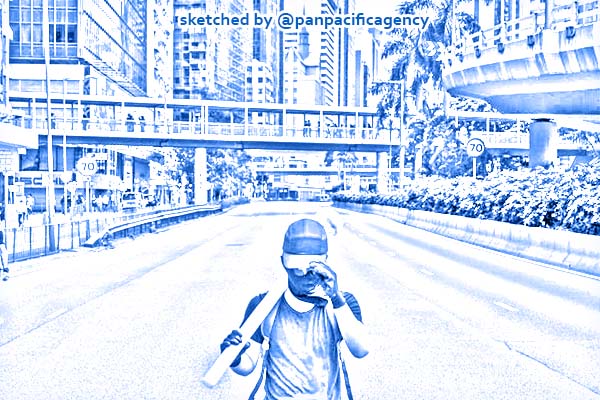US Senator blocks bill giving Hongkongers special refugee status

The decision comes as protests continue to rock Hong Kong. PHOTO: NYTIMES. Sketched by the Pan Pacific Agency.
HONG KONG, Dec 19, 2020, SCMP. A last-minute attempt by US lawmakers to push through legislation that would give Hongkongers special refugee status was thwarted on Friday, following an objection by Republican Senator Ted Cruz, South China Morning Post reported.
Taking to the Senate floor to block its approval, Cruz, of Texas, called the legislation an attempt by Democrats “to advance their long-standing goals on changing [US] immigration laws”, and claimed that Beijing would exploit relaxed immigration standards to send spies to the US.
Those who would benefit from the bill, called the Hong Kong People’s Freedom and Choice Act, would be subject to background security checks.
Under the bill, Hongkongers would be granted temporary protected status (TPS), joining citizens from 10 other countries including Syria, El Salvador and South Sudan. With TPS, those already living in the US, such as students, would be allowed to stay on in the country past the expiry of their current visa.
Hong Kong national security law has ‘chilling effect’ on freedoms, says UN human rights chief
Enacted in June, Hong Kong’s broad national security law, which can be applied to alleged crimes committed outside the city, has fuelled fears among expatriate Hongkongers that any pro-democracy advocacy work they conduct overseas may put them at risk of arrest should they return.
Beyond offering TPS, the bill would also require expedited processing of political asylum applications from Hongkongers who could demonstrate a well-founded fear of persecution.
Despite its recent unanimous passage in the House of Representatives, Cruz sought to portray the bill as part of Democrats’ “partisan political agenda” to “embrace open borders” and make all immigration legal.
With Senators soon to leave Washington for the winter break, Cruz’s objection makes it all but certain that the bill will not pass the Senate in time to be sent to the White House before Congress goes on recess, and will have to be reintroduced in January.
Led by Senator Richard Blumenthal of Connecticut, Democrats had hoped to squeeze the bill through by a mechanism known as “unanimous consent”, where time-consuming votes are dispensed with to expedite the passage of typically non-controversial bills. Any senator can stand to object to the motion.
The blockage by Cruz was met with anger among pro-democracy advocates, including those living in the US who had hoped to benefit from the bill’s provisions.
“I’m enraged,” said Jeffrey Ngo, a Georgetown University PhD student and an activist whose advocacy work has included meeting with US lawmakers. “[Cruz’s] actions today have single-handedly endangered the safety and security of me and others just like me – Hong Kong protesters currently in the US.”
“I cannot agree [with] his dismissal of the positive impact that this bill can have to the lives of real people,” Ngo said. “And not just the lives of real people, but the people who he purports to support.”
Cruz has positioned himself on Capitol Hill as a vocal advocate for Hong Kong’s pro-democracy movement, as one of a number of lawmakers, both Republican and Democrat, who have argued for a stronger US policy to counter Beijing.
But the issue of whether to accept more refugees from Hong Kong has exposed cracks in the bipartisan consensus, given Republican Party members’ general resistance to pro-immigration policies.
In a hearing on Wednesday to discuss ways the US could provide support to Hongkongers seeking political asylum, Cruz skirted the issue of immigration altogether, instead asking broad questions about witnesses’ motivations for opposing Beijing and the prevalence of US flags in Hong Kong’s protests.
Recent years have seen the Trump administration slash quotas of political refugees the US can receive, fuelling concerns among critics of a dismantling of the country’s long-standing status as a safe haven for those fleeing persecution.
For financial year 2021, the Trump administration has set the refugee ceiling at a historic low of 15,000. By contrast, the final year of the Obama administration saw the quota set at 110,000 refugees.
“America is currently shutting out the most vulnerable, and to me that is disgraceful,” said Senator Robert Menendez, Democrat of New Jersey, during Wednesday’s hearing.
Following his blockage of the Hong Kong People’s Freedom and Choice Act, Cruz on Friday sought to move a bill of his own that has languished in Congress with no cosponsors since its introduction in May. Called the SCRIPT Act, Cruz’s bill would prohibit Hollywood studios from receiving US federal funds unless they vow not to amend productions at the request of Chinese government officials.
The bill, which had little chance of moving beyond the Senate given it does not yet have approval in the House, was blocked in turn by Democrats.
“We want to tell Senator Cruz that one needs not to pick between preventing [Chinese Communist Party] censorship on the screen or saving brave activists from life in prison,” said Samuel Chu, founding head of the US-based Hong Kong Democracy Council, in a statement.
“Refusing to send Hongkongers back to become political prisoners and calling out atrocities in Xinjiang are not mutually exclusive. Fighting against the [Chinese Communist Party] and standing with Hong Kong requires every tool at our disposal.”
Additional reporting by Jacob Fromer